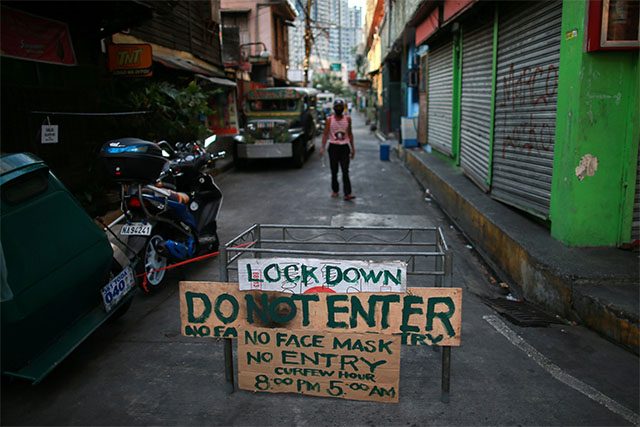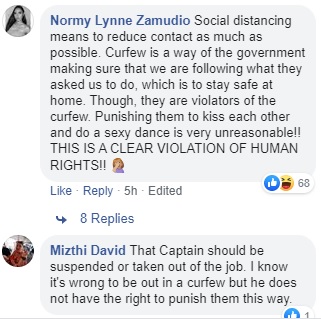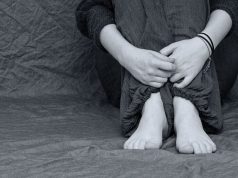
A barangay captain’s move to punish curfew violators by making them perform lewd acts and then airing it on social media is also a violation of several laws concerning human rights.
Strict curfews were implemented in several areas of Luzon following the enhanced community quarantine which was extended until April 30 to contain the spread of the novel coronavirus in the country.
Local government units were also encouraged “to be creative” in enforcing the quarantine rules in their respective jurisdictions.
Eight violators of the 8 p.m. curfew in Pandacaqui in Mexico, Pampanga were reportedly humiliated by the barangay captain, identified as Christopher Bombing Punzalan, last Palm Sunday.
Three of the violators, who happened to be members of the LGTBQ+ community, were specifically asked to perform a sexy dance in front of a 15-year-old minor who also went past the curfew time. Two of them were also asked to kiss each other.
These activities were all documented in a Facebook live video, which was deleted last April 7.
Some social media users, however, still managed to make copies of the Facebook videos and shared it online. Punzalan then received several criticisms online, with most saying that he committed more violations for the punishment he meted out.

A Twitter user cited the possible crimes the barangay captain purportedly committed to the detainees.
“Child Abuse. Sexual Harassment. Discrimination. Kailangan maparasuhan yung Barangay Captain, napaka sahol. And he did this for what? For his entertainment?” the Twitter user said.
Following the wave of criticisms, Punzalan eventually apologized, citing that he was exhausted with the daily arrests of curfew violators as his reason for punishing them that way.
“Pasensya kung meron pong nagdamdam sa nagawa natin kagabi tungkol doon sa mga LGBT. Tayo po nirerespeto yung LGBT. Siguro po dala po ng kapaguran ng araw-araw at gabi-gabi may nahuhuling pasaway na sumusuway sa utos ng katungkulan,” the village chief said.
Alleged human rights violations during quarantine
Human Rights Watch Philippines researcher Carlos Conde also expressed disappointment over the “power play” of such local officials like Punzalan.
“Whatever good the Duterte government is doing to stop the COVID-19 transmission is put to waste by these power-tripping barangay (local) officials,” Conde said.
“This can’t go on. The interior department, which has control over them, needs to take action,” he added.
Whatever good the Duterte govt is doing to stop #COVID19 is put to waste by these power-tripping barangay (local) officials. This can’t go on. The interior dept @DILGPhilippines, which has admin control over them, needs to take action. https://t.co/yQLO9aJLFP
— Carlos H. Conde (@condeHRW) April 7, 2020
Conde shared reports from the New-York based human rights group on how the basic rights of minors and other Filipinos were abused because they breached curfew regulations during the duration of the quarantine.
Human Rights Watch mentioned specific incidents wherein local authorities violated the detainee’s rights:
- Two children locked in a coffin in Cavite on March 26
- Curfew violators were forced to sit under the midday sun in Parañaque on March 25
- Five young people were locked in a dog cage in Laguna on March 20
Locking up people in confined spaces will actually increase the spread of the highly communicable disease, the organization noted, therefore, counterproductive to the goal of the government.
“Locking up people for violating emergency measures such as curfews and quarantine rules may actually increase disease transmission if people are placed in close proximity to one another in detention facilities. Children should not face criminal sanction for violating emergency measures,” the report said.
Rights group Amnesty International Philippines likewise said “there is a heightened pattern of misconduct perpetrated by barangay officials when implementing quarantine protocols.”
“Incidents of humiliation and abuse have been reported since the start of the community quarantine, such as putting curfew violators inside dog cages; beating up people with sticks; and, most recently, sexually humiliating members of the LGBTQI+ community,” Amnesty International Philippines Executive Director Butch Olano said in a press statement.
In view of this, the group is calling for the urgent probe into the abuses of these local officials and hold accountable those found to be responsible.
“The and other relevant agencies must investigate these reports of ill-treatment and penalize barangay officials and members of civilian voluntary groups who may be found to have committed these acts. These abusive practices should not be swept under the rug by local authorities under the pretense of ‘implementing curfews’ and ‘just following orders,’” Olano said.
“Acts of abuses, including torture and cruel, inhuman and degrading treatment and punishment, must not be tolerated. Skirting the law especially during the COVID-19 pandemic only further enables the already prevalent culture of impunity in the country. The law must be properly implemented, and abusive officials held accountable even during lockdowns.” he also said.
Laws against harassment and child abuse
Any form of sexual harassment in public spaces are prohibited based on the Safe Spaces Act (Republic Act 11313).
In section 4, acts of public harassment are committed “through any unwanted and uninvited sexual actions or remarks against any person regardless of the motive for committing such action or remarks.”
It also another violation if they are committed with the use of the internet.
In section 12, it is stated that:
“Gender-based online sexual harassment includes acts that use information and communications technology in terrorizing and intimidating victims through physical, psychological, and emotional threats, unwanted sexual misogynistic, transphobic, homophobic and sexist remarks and comments online whether publicly or through direct and private messages.”
Meanwhile, under the Special Protection of Children Against Abuse, Exploitation and Discrimination Act (Republic Act 7610), any action that coerces children to indulge in sexual intercourse or lascivious conduct is considered a form of child abuse.






